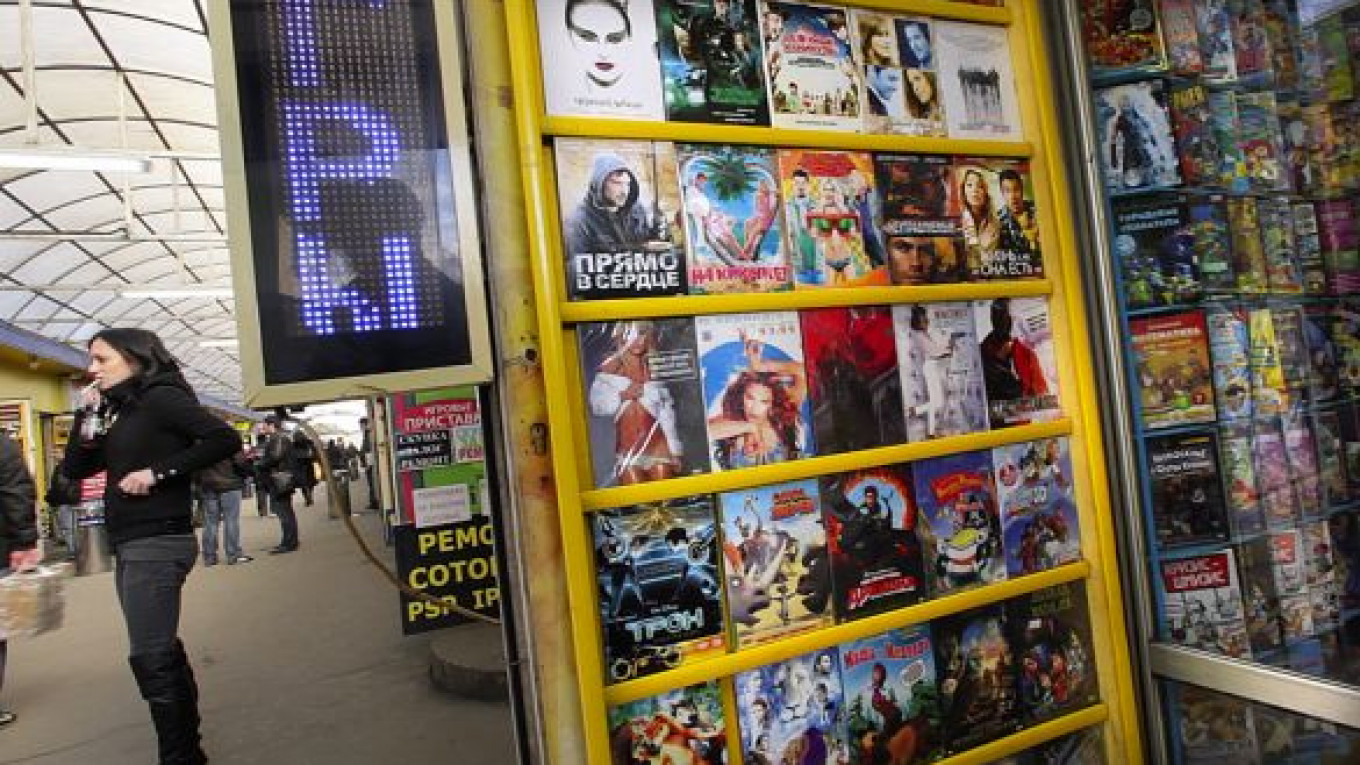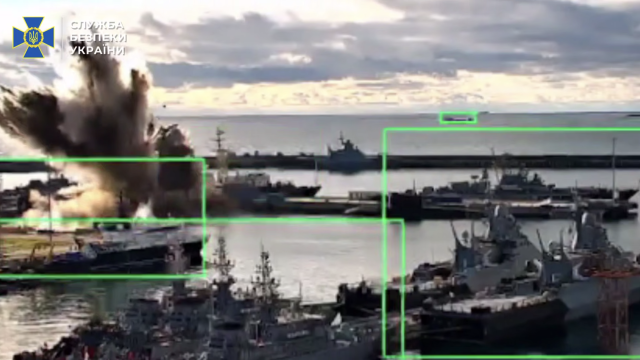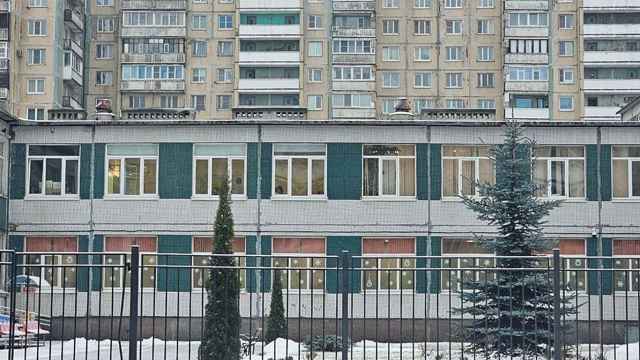At a casual glance, the Savyolovsky market looks like an ordinary sprawling complex of indoor shops, offering a variety of home appliances, videogames and DVDs with anything from the latest Hollywood flicks to trashy erotica.
Yet the enormous venue, which occupies six hectares of land just north of the 3rd Transport Ring, is also a crucial barrier to Russia's much-coveted membership in the World Trade Organization.
Russia won support in its 18-year WTO bid from U.S. Vice President Joe Biden during his visit to Moscow last week. But intellectual property violations have long served as a major hurdle to Russia's entry, as reputed piracy lairs in Moscow remain standing intact now that Biden has left the country.
The Savyolovsky market hit the spotlight just days before Biden's visit when the U.S. government put it on a list of the world's top hotbeds of piracy. The report, titled "Notorious Markets" and compiled by the U.S. Trade Representative, ranks Savyolovsky alongside the well-known Silk Market in Beijing, San Andresitos in Colombia and the Petrivka open-air market in Kiev.
"It is reported that pirated goods are widely and openly available at this electronic market in Moscow," the report said.
"These notorious markets not only hurt American workers and businesses, but are threats to entrepreneurs and industries around the world," Trade Representative Ron Kirk said in a statement accompanying the report, an initial version of a more-detailed study that will be released in April.
Savyolovsky salespeople — dominated by young, nerdy looking males — hardly batted an eyelid at the American criticism.
"I saw something about it on TV, but we will continue to do business as usual," said one salesman, who refused to give his name.
A 20-something vendor behind the next stand, selling classified address and traffic police databases, was more direct: "I fully agree with the report. You yourself know what we sell here."
Indeed, merchandise in nearby stores included pirated copies of Hollywood films and television shows both old and new. The 2010 "Burlesque" musical starring Cher was available before its official March 1 release date for 80 rubles ($2.50), while old Gary Cooper Westerns wrapped in shiny plastic cost 10 rubles apiece.
The trade is not coordinated, and Savyolovsky's owners said they were doing what they could to weed out pirates. "We can't take responsibility for every tenant," a Savyolovsky spokeswoman said.
She said, though, that Savyolovsky was monitoring the goods offered by vendors and had kicked out 47 last year for offering pirated items. Indeed, stalls selling pirated Wii games and jailbroken Wii consoles, for example, have disappeared over the past two years.
The U.S. report will not affect business at Savyolovsky because "most tenants do not follow press reports" and so will not act on them, said the spokeswoman, who spoke on condition of anonymity, citing company policy.
But some vendors acknowledged privately that copyright-related business practices in the country have been improving lately, with piracy becoming less rampant and explicit compared with even five years ago.
They also complained that Savyolovsky had been unfairly singled out from a slew of similar venues, including Moscow's Mitinsky market and Gorbushkin Dvor, formerly known as Gorbushka.
"You can go to any market — they are all the same. Actually, it has become more orderly here recently," said Dmitry, whose small pavilion sells mostly licensed videogame titles like the "Final Fantasy" role-playing series.
His prices average about 1,800 rubles ($60) — more than in the United States — but Dmitry says he still attracts plenty of customers among gamers who care for quality, not price.
Bargain-seekers don't have to go elsewhere, however, as Dmitry also offers a selection of pirated old Sega games being sold cheap. "No one really wants to pay [real] money for games because everyone assumes they should cost kopeks," he said.
He and other traders pointed the finger at the legendary Gorbushkin Dvor, once the No. 1 place to obtain pirated films and music, as the reason people didn't feel inclined to pay for licensed goods.
Gorbushkin Dvor, which was not included on the U.S. report, has been slowly changing under the pressure of copyright protectors.
"We are glad to not make the list," Gorbushkin Dvor marketing manager Mark Berger said.
The company that owns the venue put a lot of effort into fighting piracy, monitoring goods on sale and providing free training to vendors, he said.
A spokeswoman for the Interior Ministry's cybercrime department, Larisa Zhukova, said illegal activity decreased at Gorbushkin Dvor last year. But she added that it and other markets were still under close surveillance.
Nevertheless, the markets may not be the main headache anymore thanks to the Internet. Along with Savyolovsky, the "Notorious Markets" report lists the Vkontakte.ru social network and Rutracker.org torrent tracker as piracy havens. Both sites are "notorious for infringing activities" and permit users to obtain pirated content, the report said.
A representative for Rutracker.org, which is registered in the Seychelles, said the site was cooperating with U.S. content producers and allowing them to delete illegal torrents uploaded to the web site.
"That kind of statement is political and often doesn't correspond with reality," he said of the U.S. report, Gazeta.ru reported.
A spokesman for Vkontakte.ru, which numbers about 28 million users, also said the report "doesn't reflect things" done by the company to fight piracy. One move saw some 100,000 copyrighted videos purged from the network after its producer, TNT television, was given permission to remove illegally uploaded content, he said.
An official at the piracy watchdog Russian Shield, Oleg Yashin, said the U.S. report's findings were outdated and "too vague."
"It looks like the people who were conducting it are not real experts," Yashin said, adding that Rutracker.org's collaboration with legal content providers is a well-known fact.
He agreed, though, that Savyolovsky was a leading source of pirated content in the capital, while Gorbushkin Dvor has managed to clean up its act and now mostly carries home appliances.
Sales of pirated software in Moscow actually plummeted 40 percent in 2010 and amounted to about 168 million rubles ($6 million) a month in February, according to Russian Shield data.
But improved government policies and crackdowns have little to do with the decrease because piracy is simply going online, Yashin said.
Rampant piracy is especially harmful for software producers, which have no means to compensate for losses causes by illegal downloads. In contrast, musicians and film stars have many ways to capitalize on their fame.
"Program developers can't travel and perform concerts like rock stars," Yashin said.
More than two-thirds of all software in Russia was pirated in 2009, Yashin said, citing joint estimates by the Business Software Alliance and IDC research.
If legally purchased, the programs could have brought $2.6 billion to their developers, he said. But so far, developers are fighting an uphill battle against Savyolovsky and the World Wide Web.
A Message from The Moscow Times:
Dear readers,
We are facing unprecedented challenges. Russia's Prosecutor General's Office has designated The Moscow Times as an "undesirable" organization, criminalizing our work and putting our staff at risk of prosecution. This follows our earlier unjust labeling as a "foreign agent."
These actions are direct attempts to silence independent journalism in Russia. The authorities claim our work "discredits the decisions of the Russian leadership." We see things differently: we strive to provide accurate, unbiased reporting on Russia.
We, the journalists of The Moscow Times, refuse to be silenced. But to continue our work, we need your help.
Your support, no matter how small, makes a world of difference. If you can, please support us monthly starting from just $2. It's quick to set up, and every contribution makes a significant impact.
By supporting The Moscow Times, you're defending open, independent journalism in the face of repression. Thank you for standing with us.
Remind me later.






